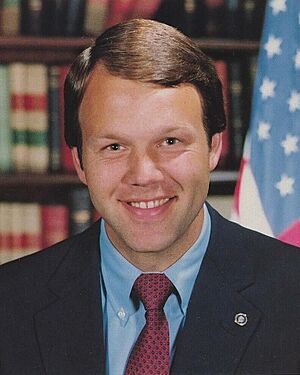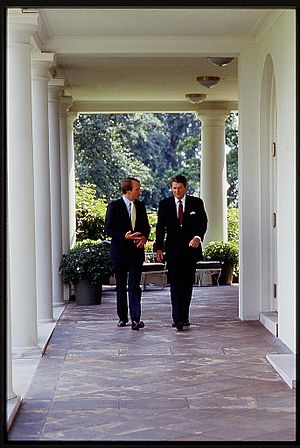Don Nickles facts for kids
Quick facts for kids
Don Nickles
|
|||||||||||||||||||||||||||||||||||||||||||||||||||
|---|---|---|---|---|---|---|---|---|---|---|---|---|---|---|---|---|---|---|---|---|---|---|---|---|---|---|---|---|---|---|---|---|---|---|---|---|---|---|---|---|---|---|---|---|---|---|---|---|---|---|---|
 |
|||||||||||||||||||||||||||||||||||||||||||||||||||
| United States Senator from Oklahoma |
|||||||||||||||||||||||||||||||||||||||||||||||||||
| In office January 3, 1981 – January 3, 2005 |
|||||||||||||||||||||||||||||||||||||||||||||||||||
| Preceded by | Henry Bellmon | ||||||||||||||||||||||||||||||||||||||||||||||||||
| Succeeded by | Tom Coburn | ||||||||||||||||||||||||||||||||||||||||||||||||||
|
|||||||||||||||||||||||||||||||||||||||||||||||||||
| Member of the Oklahoma Senate from the 20th district |
|||||||||||||||||||||||||||||||||||||||||||||||||||
| In office January 2, 1979 – January 3, 1981 |
|||||||||||||||||||||||||||||||||||||||||||||||||||
| Preceded by | Roy Grantham | ||||||||||||||||||||||||||||||||||||||||||||||||||
| Succeeded by | William O'Connor | ||||||||||||||||||||||||||||||||||||||||||||||||||
| Personal details | |||||||||||||||||||||||||||||||||||||||||||||||||||
| Born |
Donald Lee Nickles
December 6, 1948 Ponca City, Oklahoma, U.S. |
||||||||||||||||||||||||||||||||||||||||||||||||||
| Political party | Republican | ||||||||||||||||||||||||||||||||||||||||||||||||||
| Spouse | Linda Lou Morrison | ||||||||||||||||||||||||||||||||||||||||||||||||||
| Children | 4 | ||||||||||||||||||||||||||||||||||||||||||||||||||
| Education | Oklahoma State University–Stillwater (BA) | ||||||||||||||||||||||||||||||||||||||||||||||||||
Donald Lee Nickles (born December 6, 1948) is an American politician who served as a United States Senator for Oklahoma. He was a member of the Republican Party and was in office from 1981 to 2005.
Nickles was known for his conservative views. This means he believed in lower taxes and less government spending. He also held traditional views on social issues. After he retired from the Senate, he started a company called the Nickles Group. This company advises businesses on how to work with the government.
Contents
Early Life and Education
Don Nickles was born and grew up in Ponca City, Oklahoma. He went to public schools there and graduated from Ponca City High School in 1967.
To help pay for college at Oklahoma State University, he and his wife, Linda, ran their own cleaning business. He studied business administration and graduated in 1971. While in college, he was a member of the Beta Theta Pi fraternity.
After graduating, Nickles worked for his family's business, Nickles Machine Corporation. His grandfather had started the company in 1918. Nickles eventually became the company's vice president. From 1970 to 1976, he also served in the Oklahoma Army National Guard.
A major event in his childhood was the death of his father when he was twelve. His family had to sell part of their business to pay the estate tax, which is a tax on the property someone leaves behind when they die. This experience shaped many of his later political ideas.
Start in Politics
In 1978, at age 29, Nickles was elected to the Oklahoma State Senate. This was the start of his career in politics. Just two years later, when he was 31, he was elected to the U.S. Senate. He was the youngest Republican ever to be elected to the Senate.
Career in the U.S. Senate

As a senator, Nickles worked on laws to cut taxes and lower government spending. He also focused on strengthening the country's defense. He sponsored the Defense of Marriage Act, a law that allowed states to refuse to recognize same-sex marriages from other states.
In 1986, during a speech at the University of Oklahoma, President Ronald Reagan accidentally called him Don Rickles, who was a famous comedian. The president thought the mistake was very funny when he found out.
Nickles was one of only three senators who voted against confirming Ruth Bader Ginsburg to the Supreme Court. He also voted against Stephen Breyer. He disagreed with their views on certain legal issues, including the court's decision in Roe v. Wade.
Leadership Roles
Nickles became an important leader among the Senate Republicans. He held several key positions, including:
- Chairman of the National Republican Senatorial Committee
- Chairman of the Republican Policy Committee
- Assistant Republican Leader (also known as the Republican Whip)
As the Republican Whip, his job was to make sure other Republican senators voted along with the party's goals. In 2002, he played a role in a major change in Senate leadership. The Republican Leader at the time, Trent Lott, made comments that were seen as racially insensitive. Nickles was the first Republican leader to say publicly that Lott should resign. He felt the issue was distracting from the party's work. Lott soon stepped down.
Nickles was re-elected three times, in 1986, 1992, and 1998. When he retired, he was the longest-serving senator in Oklahoma's history up to that point.
Life After the Senate
In 2003, Nickles announced he would not run for re-election. After leaving the Senate in 2005, he started the Nickles Group. It is a consulting firm in Washington, D.C., that helps businesses understand government policies. He also serves on the board of directors for several companies, including Chesapeake Energy.
Nickles also appeared in the movie Traffic, where he shared his thoughts on the nation's drug policies.
Family
Nickles and his wife, Linda, have four children.
 | Bessie Coleman |
 | Spann Watson |
 | Jill E. Brown |
 | Sherman W. White |

